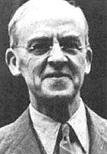Difference between revisions of "Stafford Cripps"
Tom Griffin (talk | contribs) (started a page) |
|||
| (2 intermediate revisions by 2 users not shown) | |||
| Line 1: | Line 1: | ||
| + | [[File:Stafford Cripps.jpg|200px|thumb|right|Richard Stafford Cripps]] | ||
| + | |||
Sir Richard [[Stafford Cripps]] (1889-1952) was a [[Labour Party]] politician. He was educated at Winchester School and the University of London before becoming a barrister. He was knighted in 1930. He was Labour MP for East Bristol 1931-1950 and for South East Bristol in 1950. He was Solicitor-General 1930-1931, British Ambassador to the USSR, 1940-1942, Lord Privy Seal and Leader of the House of Commons, 1942, Minister of Aircraft Production 1942-1945, President of the Board of Trade 1945-1947, Minister for Economic Affairs 1947, and Chancellor of the Exchequer 1947-1950.<ref>David Butler and Gareth Butler, Twentieth-Century British Political Facts 1900-2000, Macmillan, 2000, p.79.</ref> | Sir Richard [[Stafford Cripps]] (1889-1952) was a [[Labour Party]] politician. He was educated at Winchester School and the University of London before becoming a barrister. He was knighted in 1930. He was Labour MP for East Bristol 1931-1950 and for South East Bristol in 1950. He was Solicitor-General 1930-1931, British Ambassador to the USSR, 1940-1942, Lord Privy Seal and Leader of the House of Commons, 1942, Minister of Aircraft Production 1942-1945, President of the Board of Trade 1945-1947, Minister for Economic Affairs 1947, and Chancellor of the Exchequer 1947-1950.<ref>David Butler and Gareth Butler, Twentieth-Century British Political Facts 1900-2000, Macmillan, 2000, p.79.</ref> | ||
| + | |||
| + | ==President of the Board of Trade== | ||
| + | Cripps was a strong influence on [[Harold Wilson]] who served under him at the Board of Trade. This may have contributed to the [[Security Service]]'s interest in Wilson as [[Roger Hollis]], then head of Communist Affairs at [[MI5]] regarded Cripps as a communist sympathiser.<ref>Stephen Dorril and Robin Ramsay, ''Smear: Wilson and the Secret State'', Fourth Estate Limited, 1991, p.4.</ref> Sir [[Kenneth Berril]] would also come under MI5 suspicion because of his role on Cripps' staff at about this time.<ref>Stephen Dorril and Robin Ramsay, ''Smear: Wilson and the Secret State'', Fourth Estate Limited, 1991, p.300.</ref> | ||
| + | |||
| + | Cripps particularly angered the security establishment by approving the sale of Rolls Royce jet engines to the Soviet Union, although the particular engines involved were obsolete.<ref>Stephen Dorril and Robin Ramsay, ''Smear: Wilson and the Secret State'', Fourth Estate Limited, 1991, p.7.</ref> | ||
| + | |||
| + | ==External Resources== | ||
| + | *Namebase [http://www.namebase.org/cgi-bin/nb01?Na=Cripps%2C+Stafford CRIPPS STAFFORD] | ||
==Notes== | ==Notes== | ||
<references/> | <references/> | ||
| − | [[Category:Old Wykehamists|Cripps, Stafford]][[Category:Labour Party|Cripps, Stafford]][[Category:MP|Cripps, Stafford]][[Category:UK Ministers|Cripps, Stafford]] | + | [[Category:Old Wykehamists|Cripps, Stafford]][[Category:Labour Party|Cripps, Stafford]][[Category:MP|Cripps, Stafford]][[Category:UK Ministers|Cripps, Stafford]] [[Category:British Politician|Cripps, Stafford]] |
Latest revision as of 12:12, 4 March 2015
Sir Richard Stafford Cripps (1889-1952) was a Labour Party politician. He was educated at Winchester School and the University of London before becoming a barrister. He was knighted in 1930. He was Labour MP for East Bristol 1931-1950 and for South East Bristol in 1950. He was Solicitor-General 1930-1931, British Ambassador to the USSR, 1940-1942, Lord Privy Seal and Leader of the House of Commons, 1942, Minister of Aircraft Production 1942-1945, President of the Board of Trade 1945-1947, Minister for Economic Affairs 1947, and Chancellor of the Exchequer 1947-1950.[1]
President of the Board of Trade
Cripps was a strong influence on Harold Wilson who served under him at the Board of Trade. This may have contributed to the Security Service's interest in Wilson as Roger Hollis, then head of Communist Affairs at MI5 regarded Cripps as a communist sympathiser.[2] Sir Kenneth Berril would also come under MI5 suspicion because of his role on Cripps' staff at about this time.[3]
Cripps particularly angered the security establishment by approving the sale of Rolls Royce jet engines to the Soviet Union, although the particular engines involved were obsolete.[4]
External Resources
- Namebase CRIPPS STAFFORD
Notes
- ↑ David Butler and Gareth Butler, Twentieth-Century British Political Facts 1900-2000, Macmillan, 2000, p.79.
- ↑ Stephen Dorril and Robin Ramsay, Smear: Wilson and the Secret State, Fourth Estate Limited, 1991, p.4.
- ↑ Stephen Dorril and Robin Ramsay, Smear: Wilson and the Secret State, Fourth Estate Limited, 1991, p.300.
- ↑ Stephen Dorril and Robin Ramsay, Smear: Wilson and the Secret State, Fourth Estate Limited, 1991, p.7.
